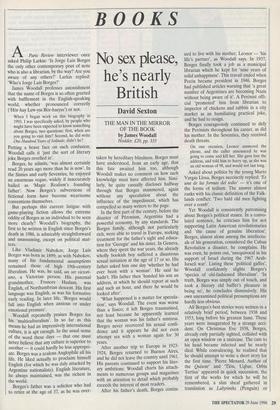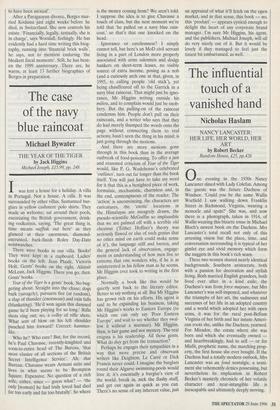BOOKS A Paris Review interviewer once asked Philip Larkin: 'Is Jorge
Luis Borges the only other contemporary poet of note who is also a librarian, by the way? Are you aware of any others?' Larkin replied: `Who's Jorge Luis Borges?'
James Woodall professes astonishment that the name of Borges is so often greeted with bafflement in the English-speaking
When I began work on this biography in 1993, I was specifically asked, by people who might have been expected to know something about Borges, two questions: first, when are you going to visit him? Second, he did write One Hundred Years of Solitude, didn't he?
Putting a brave face on such confusion, Woodall calls it 'just the sort of literary joke Borges revelled in'.
Borges, he admits, 'was almost certainly read 20 years ago more than he is now'. In the Sixties and early Seventies, he enjoyed an enormous vogue, widely if inaccurately hailed as 'Magic Realism's founding father'. Now Borges's subversions of fictional form have become wearisome conventions themselves.
But perhaps this current fatigue with game-playing fiction allows the extreme oddity of Borges as an individual to be seen more clearly? Woodall's biography, the first to be written in English since Borges's death in 1986, is admirably straightforward and unassuming, except on political mat- ters.
Like Vladimir Nabokov, Jorge Luis Borges was born in 1899; as with Nabokov, many of his fundamental assumptions remained those of high 19th-century liberalism. He was, he said, un ser victori- ano, a Victorian person. His paternal grandmother, Frances Haslam, was English, of Northumbrian descent. His first language was English, as was his formative early reading. In later life, 'Borges would fall into English when anxious or under emotional pressure'. Woodall repeatedly praises Borges for his 'multiculturalism'. In so far as this means he had an impressively international culture, it is apt enough. In the usual sense of the word these days — that one must never believe that any culture is superior to another — it could hardly be less appropri- ate. Borges was a zealous Anglophile all his life. He liked actually to proclaim himself English (for which he was duly attacked by Argentine nationalists). English literature, he always maintained, was the richest in the world.
Borges's father was a solicitor who had to retire at the age of 37, as he was over-
No sex please, he's nearly British
David Sexton
THE MAN IN THE MIRROR OF THE BOOK by James Woodall Hodder, f20, pp. 333
taken by hereditary blindness. Borges must have understood, from an early age, that this fate awaited him too, although Woodall makes no comment on how such knowledge must have affected him. Simi- larly, he quite casually discloses halfway through that Borges stammered, again without any speculation about the influence of the impediment, which has compelled so many writers to the page. In the first part of the century, before the disaster of Peronism, Argentina had a powerful economy, by any standards. The Borges family, although not particularly rich, were able to travel in Europe, seeking treatment for the father's sight and educa- tion for 'Georgie' and his sister. In Geneva, where they spent the war years, the already wholly bookish boy suffered a disastrous sexual initiation at the age of 17 or so. His father asked him one day 'whether he had ever been with a woman'. He said he hadn't. His father then 'handed his son an address, at which he should report at such and such an hour, and there he would be looked after'.
`What happened is a matter for specula- tion', says Woodall. The event was worse than a fiasco; it left Borges traumatised, not least because he apparently learned that the woman was his father's mistress.
Borges never recovered his sexual confi- dence and it appears he did not even attempt sex with a woman again for 30 years. After another trip to Europe in 1923- 1924, Borges returned to Buenos Aires, and he did not leave the country until 1961. His parents continued to support his liter- ary ambitions: Woodall charts his attach- ments to numerous groups and magazines with an attention to detail which probably exceeds the interest of most readers.
After his father's death, Borges contin- ued to live with his mother, Leonor — 'his life's partner', as Woodall says. In 1937, Borges finally took a job as a municipal librarian which he kept for 'nine years of solid unhappiness'. This travail ended when Peron became president in 1946. Borges had published articles warning that 'a great number of Argentines are becoming Nazis without being aware of it'. A PerOnist offi- cial 'promoted' him from librarian to inspector of chickens and rabbits in a city market as an humiliating practical joke, and he had to resign.
Borges courageously continued to defy the Peronists throughout his career, as did his mother. In the Seventies, they received death threats.
On one occasion, Leonor answered the phone, and the caller announced he was going to come and kill her. She gave him the address, and told him to hurry up, as she was an old woman of 98, and would not last long.
Asked about politics by the young Mario Vargas Llosa, Borges succinctly replied: 'Es una de las forms del tedio' — it's one of the forms of tedium. The answer almost ranks with his classic definition of the Falk- lands conflict: 'Two bald old men fighting over a comb'.
Yet Woodall is consistently patronising about Borges's political stance. In a convo- luted sentence, he criticises him for not supporting Latin American revolutionaries and 'the cause of genuine liberation'.
Borges, almost alone among the intellectu- als of his generation, considered the Cuban Revolution a disaster, he complains. He was even, he points out, 'unequivocal in his support of Israel during the 1967 Arab- Israeli war'. Listing these 'political gaffes', Woodall confidently slights Borges's `species of old-fashioned liberalism'. 'In truth, Borges was simply out of touch, and took a literary old buffer's pleasure in being so', he concludes dismissively. His own unexamined political presumptions are hardly less obvious.
All Borges's best stories were written in a relatively brief period, between 1938 and 1953, long before his greatest fame. These years were inaugurated by a strange acci- dent. On Christmas Eve 1938, Borges, already only partially sighted, collided with an open window on a staircase. The cuts to his head became infected and he nearly died. While convalescing, he realised that he should attempt to write a short story for the first time. 'Pierre Menard, Author of the Quixote' and 'Win, Uqbar, Orbis Tertius' appeared in quick succession, the first of the works for which he will be remembered, a slim sheaf gathered in translation as Labyrinths (Penguin) or Fictions (Everyman).
It was during these years that Borges again attempted a sexual relationship, hav- ing met an attractive Uruguayan woman in her late twenties, Estela Canto, who has published a memoir of their friendship. Borges, says Woodall, was sexually 'paral- ysed', fearful both of women and of his own sexuality. In his mid-forties, he did not know the first thing — and this moreover in the macho culture of Argentina, which prizes sodomy so, never mind anything else. 'Sexual realisation was terrifying for him', Estela Canto states. With her, it never happened and they gradually parted. `In later years, he admitted to her that he did succeed finally in having sexual rela- tions, with a dancer.' Woodall believes that this was 'the only sexually intimate rela- tions of his adult life', though he was even- tually twice married.
Woodall doesn't speculate too much about the influence Borges's sexual fear had on his work, but surely it illuminates it a great deal? His long-term collaborator Adolfo Bioy once praised the literature of the fantastic for lacking 'all human ele- ments, emotional or sentimental'. Borges's tales are certainly humanly thin. They appeal most strongly in adolescence. Then their epistemological games seem to offer a kind of secret power over normal life and its demands. Read again, later in life, their charm seems strangely diminished. For all their ingenuity and sophistication, they clearly come from the same emotional sources as the dismal fantasy fiction with which so many assuage their disappoint- ments, as the bestseller lists dishearteningly demonstrate.
By the time Borges began to enjoy great international success, he had little new left to say. 'What Borges hoped for now was that life, his life, would simply get better.' Initially with his mother, he travelled all over Europe, giving lectures.
Now blind, he wanted simple domestic happiness. A friendship with a journalist in her early twenties ended in bitterness, when she married her boyfriend. On the rebound, he married a widow called Elsa, then 57, who had chucked him in much the same way 20 years earlier. But she had no interest in literature and did not speak English. After three unhappy years, he went out one breakfast time, and never returned. When he left that day, Elsa had asked Borges what he wanted for lunch and he had replied: Tuchero' (stew). Twenty- three years later, she told Woodall: 'What pained me most was that when Borges asked for puchero, he already knew he wouldn't be coming back.'
In 1975, his mother died, aged 99. In his last decade, Borges shared his life and travels with a young Japanese-American woman named Maria Kodama. 'It is impos- sible to know if they had physical relations, other than by asking Maria Kodama direct- ly', says Woodall innocently, before giving his firm opinion that the 'relationship has to have been asexual'.
After a Paraguayan divorce, Borges mar- ried Kodama just eight weeks before he died, in Switzerland. She now controls his estate. 'Financially, legally, textually, she is in charge', says Woodall, feelingly. He has evidently had a hard time writing this biog- raphy, running into 'financial brick walls', he says, not to mention enduring 'the bleakest fiscal moments'. Still, he has beat- en the 1999 anniversary. There are, he warns, at least 13 further biographies of Borges in preparation.




























































 Previous page
Previous page